Journal prompts, Journaling for beginners
Anger Journaling – Writing through Anger
Managing anger using the power of journaling:
If you ask me my favorite emotion to journal on, it will always be Anger. Since childhood, I was a furious kid, a rebellious teen, and growing up my anger grew with me. So, if you’re someone who is struggling with managing anger and want to learn some mindful ways to feel calm, this post is for you.
Ever since I launched my amazing Anger Journaling Course, I have been asked various questions regarding controlling wild rage, fixing anger, and being at peace with self and this is when I realized we need an entire blogpost on some mindful ways to manage anger.
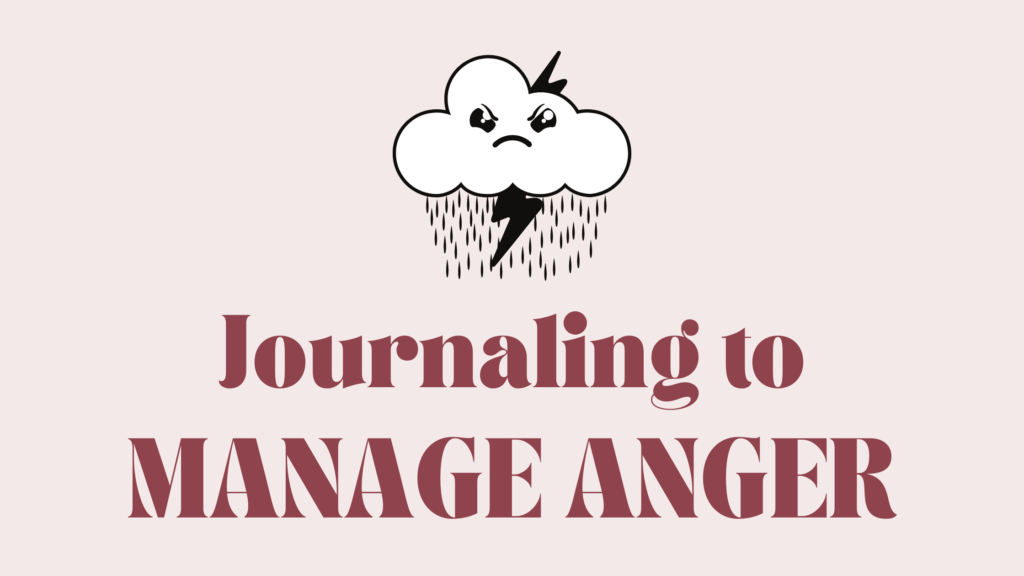
I already have a blog post that teaches you how to use journaling for managing anger so in this post, I will be talking particularly about what goes behind your anger (just as I discuss this in-depth in my course) and the journal prompts to help you manage your anger.
My intention through this post is to help you manage your Anger but put your rage on the page and feel the peace, love, and calm of life.
But before that, let’s talk about what is anger and why do we get angry in the first place.
What exactly is Anger?
Anger is nothing but an emotion just like all other emotions; sadness, happiness, joy, sorrow, frustration, etc. Anger is just an emotion.
However, we have categorized Anger as a bad emotion because it brings out our worst reaction. We are out of our own control when we are in anger and we do, say things that we don’t truly mean to do or say.
Anger spoils relationships. It creates an environment of tension, anxiety, and frustration around us and hence we have labeled this emotion as a bad one.
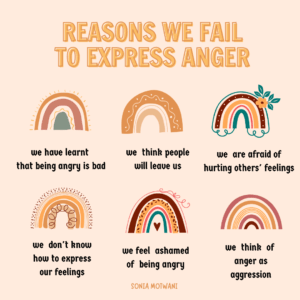
But in the real sense, no emotions are bad ones; not even anger. Emotions are a part of our human experience and they reveal so much about our inner state. By labeling emotions as bad, we are just preventing ourselves from healing those emotions.
Anger is always a substitute or a secondary emotion. The pain or hurt inside of you gets triggered which comes out as Anger. There’re other emotions hidden behind your anger and this is why healing your anger is so essential.
How long can you carry on with your life being totally unknown to what’s actually happening within?
This is your chance and opportunity to really dig deeper and understand what your Anger is speaking to you.
Let’s understand the reason behind our anger. Why do we get Angry and the answer will shock you!!
Why do we get Angry?
If I asked you, why do you get angry – what will be your response?
It can be; ‘Xyz said this or did this which made me angry’ or ‘My boss insulted me in front of everyone which made me angry’ or ‘My kids won’t listen to me and I am feeling really angry’.
You’re not wrong because I would have said something similar if you asked me the reason behind my anger before a year.
I was someone who had no idea how to control her anger, I would say things that I don’t mean when I am angry only to regret it later, I have lost friends because of my anger and so I know how it feels to not be able to control your anger and let your life so upside down in front of you.
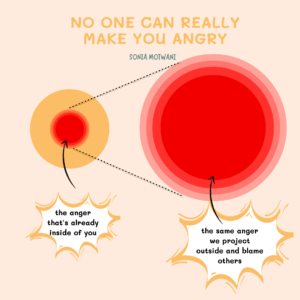
However, when I started learning more about anger and connecting anger with journaling, things started shifting. I was monitoring my anger, keeping daily logs, and journaling using the prompts below and it really helped me.
But, what helped me above everything else was this single sentence:
‘NO ONE CAN MAKE YOU FEEL ANYTHING’
I know it’s difficult to accept if you’re reading this for the first time but this is an absolute truth. I explain this in detail inside my course that no one has the power to make you feel anything.
We already have feelings inside of us, what others are doing is just projecting those emotions outside. If someone is making you feel loved, it means you already have the feeling of love within. That someone is just projecting your feelings in form of a response you give.
Similarly, if someone is making you feel the anger, you already have unhealed anger inside of you which is just getting projected.
I repeat; ‘No one can make you feel anything’, and when you understand this, you will take complete responsibility of your thoughts, feelings, and actions.
Now, if no one externally can make you feel this anger, where does the anger inside of you come from? Let me explain:
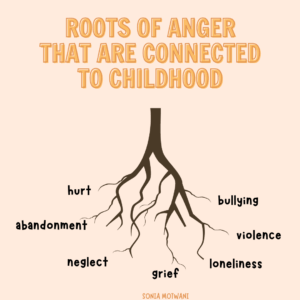
Where does the anger within come from?
During my anger healing journey, I realized that my anger was stemming from my angry inner child. This was when I knew I needed to heal my inner child in order to get to the roots of my anger.
I used to be an angry kid because I was always told to be SILENT, to lower my voice, to not speak up, and growing up I carried this as a belief that my voice doesn’t matter and no one wants to listen to me what I had to say.
My inner child was angry because she wasn’t given the permission to speak up, to present her opinion, or to raise her voice just because I am a woman. And women in our society should shut their mouths and eat their words. Women in our society should only be seen and not be heard. They tell you you are ill-mannered and disregard you if you present your opinion.
This was why I was always angry and my anger grew along with me. Your anger can be from various different aspects like past trauma, painful childhood, injustice, avoidance, societal pressure, beliefs of caregivers, etc.
However, you cannot just live your life blaming your past or anyone from your past. It’s now your responsibility to heal yourself, to heal your anger, and live an aligned, peaceful and abundant life that you’re truly meant to live.
The third module of my Anger Journaling course is solely on ‘Healing your angry inner child where I teach you how to reparent yourself, how to dive deeper and help your angry inner child to have peace.
You may wonder why Journaling for managing anger when there’re other tools available.
( I have an intensive course on Anger Journaling that covers everything you need to heal your Anger and bring in peace and abundance in your life. Check it out here)
Journaling for Managing Anger:
Many of us express anger in order to numb our pain but that really doesn’t help. You need to process your emotions, those tough feelings in order to actually heal yourself. I know this isn’t easy and at times even I fail at this but when I remind myself of how much this is affecting me, my mental health, and my community; I realize my ‘why’.
Journaling has been proven as a profound way to process emotions and handle them with a third-person view. When you’re writing, you actually are an observer of the event that happened so it’s easy to detach yourself.
This beautiful art provides you with a non-judgmental space to vent out, to vomit your true feelings on paper. Sometimes, we silence ourselves and shield our feelings with anger which never really helps us. These numbed feelings are then manifested as yelling, shouting, or can even harm our physical health. If you’re new to journaling, do not worry. There absolutely are no rules here and you can never journal the wrong way.
- Journaling renders you space to sit back and evaluate your thoughts, behaviors, and emotions
- Provides you with the opportunity to choose different thoughts
- Guides you to be aware of your thought patterns, notice the triggers and be mindful of what to do next
- Offers clarity around overwhelming thoughts
- Brings you in the space of utter bliss and peace
- Lowers your emotional reactivity to others
- Helps you to look at things from a different perspective
- Validates all your emotions and makes you feel humane
Anger management could really be challenging if you don’t have the tools to help you with the same.
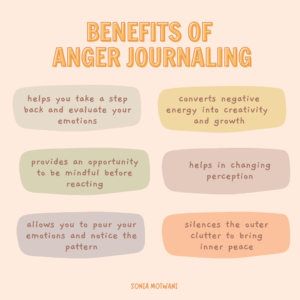
Journal prompts to manage your anger:
Here’re some mindful journal prompts to help you manage your anger:
- What are you angry about? What actually happened? How did it affect you? What was your reaction for the same and what were the consequences? Braindump all the thoughts that are occupying your head. Write starting with; ‘I am ANGRY because………….’
- What are you hiding behind your anger? As anger is a secondary emotion, it’s always used as a shield to protect you from feeling tough feelings. What is the emotion behind your anger? What are you scared of feeling that bursts out as anger?
- If you had to converse with anger; how would anger speak to you? What this anger would tell you about yourself, about your life?
- Do a word association method when you feel angry. Write a word that comes to your mind when you’re in anger and create a bubble of words until there are no words left.
- Write several concrete steps you can take, along with how you will accomplish them. How can you respond differently or what do you need to do to protect yourself from being hurt again?
- Write about the ways you can use your anger constructively. If you don’t find any way yet, it’s okay. Remind yourself to come back to this prompt again.
Our anger behaviors and dominant styles relate so much to healing our angry inner-child and practicing forgiveness.
We do, say things in anger that we later regret and carry this guilt forever with us. This makes us believe that we are wrong, that we are undeserving of someone’s love. that we don’t matter.
I don’t want you to carry the guilt of anger on your heart for the rest of your life and this is why I created an epic course on managing your anger through journaling.
In this intensive, self-paced five-week course; I teach you everything you need to know about the psychology of anger, what’s your anger speaking to you, how to heal your angry inner child, and how to practice forgiveness and embark on the journey of self-healing.
The Anger Journaling is my signature course that comes with five journals alongside the 5 hours of video learning. Here’re the details to check out what’s inside the Anger Journaling course. Feel free to comment below if you’re struggling with anger and you have any questions. I would love to help you.


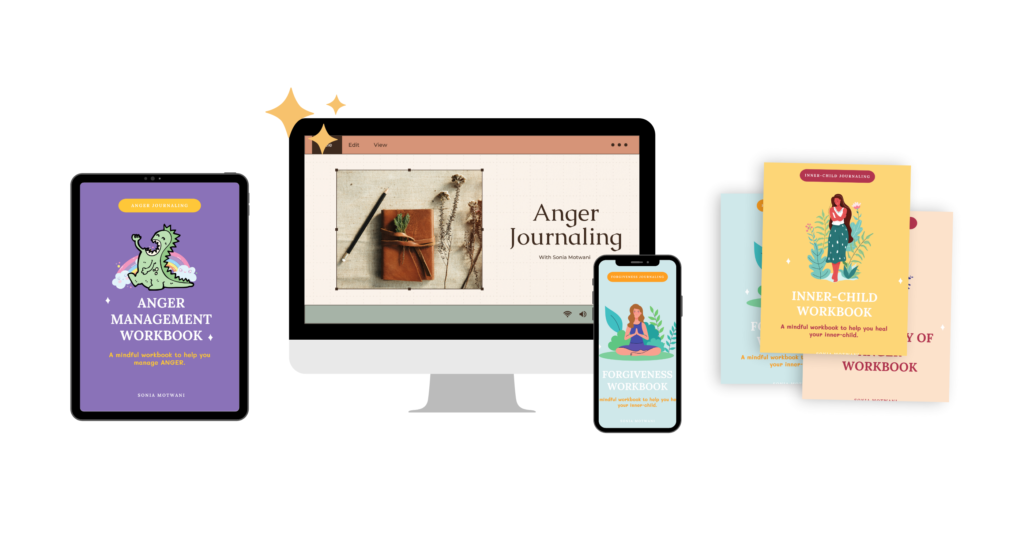
Leave a Reply